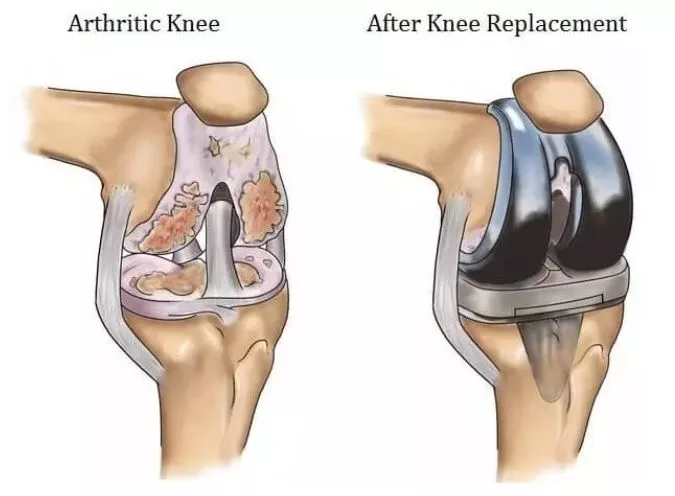
Total Knee Replacement Surgery: We will start an interesting journey into the world of knee replacement in this blog post, giving you a full picture of this life-changing surgery. This post will help you find your way through the whole process, from making the first preference to the operating room and back again afterward. We detail the complex knee replacement surgery procedure, explaining its steps and why they are important.
Introduction
Many people who need knee replacements first have long-term knee pain, usually caused by osteoarthritis. The knee joint wears away over time because of this degenerative disease, which makes bone-on-bone touch painful. Many patients say the pain is a constant, annoying feeling that gets worse when they move.
Things like going up and down stairs, getting up from a sitting position, and even walking get harder. Painkillers, physical therapy, or corticosteroid shots are examples of non-surgical treatments that might help for a short time, but they are often not enough for serious cases.
Besides the bodily pain, the mental toll is also very heavy. People who are in chronic pain may become angry, anxious, or depressed, which can have a big effect on their quality of life. At this point, surgery to replace the knee becomes a sign of hope for a pain-free life.
Life Before Knee Replacement
Choosing to have a total knee replacement surgery is a big one that usually comes after a lot of talks with doctors, thinking about how long the surgery will take, and thinking about one’s quality of life. Most people decide to have surgery when their knee pain is unbearable, makes it hard for them to move around, and drastically lowers their quality of life.
It’s important to fully understand the process, including how long healing from knee replacement surgery should take. Patients are shown the steps and told about any worries or fears, such as the type of replacement knee joint used and how long it takes to heal after a total knee replacement surgery.
Preparing for Total Knee Replacement Surgery
Always let your doctor know about your medicines, even if you got them without a prescription.
Before your surgery, two weeks before it:
Stop clotting-disrupting medicines two weeks before surgery. For Example,
- Aspirin
- Ibuprofen (Advil, Motrin)
- Naproxen (Naprosyn, Aleve)
- Blood thinners like warfarin (Coumadin) or clopidogrel (Plavix)
- Other drugs like (Xarelto)
Also, you might need to stop taking drugs that can make you more likely to get sick. Some examples are methotrexate, etanercept (Enbrel), and other drugs that weaken your immune system. Make sure you ask your doctors when it is safe to start taking these drugs again.
- Talk to your doctor about which medicines you should still take on the day of your surgery.
- For safety reasons, your surgeon may want you to see your diabetes, heart disease, or other doctor before surgery.
- Before surgery, you should always tell your doctor if you have a cold, the flu, a fever, shingles, or other sickness.
- You might want to see a physical therapist before surgery to get some exercise.
- Make your home easier to use by setting it up the right way.
- Learn how to use a wheelchair, cane, walker, or crutches.
The Surgical Experience
Your surgeon will provide an anesthetic to you on the day of your procedure to dull any pain sensations and ensure a smooth recovery. The doctor will give you either general anesthesia or regional anesthesia. General anesthesia will put you to sleep during and after surgery.
Your doctor will do the following during a knee replacement:
- Take out the broken bone and tissue.
- Put the prosthetic Knee Implants joint in place.
- Place a plastic gap between your bones to replace the smooth cushion of cartilage that was broken or taken away.
- Reshape your patella (kneecap) so it fits the new artificial Knee Implants, if necessary.
Post-Surgery Recovery Phase
You will be in the hospital for one or two days. During that time, you will get better from both the surgery and the drugs. You will be told to get up and walk around as early as the day after surgery.
It will take between 4 months and a year to get better.
Some people need to stay at a rehab center for a short time after they get out of the hospital but before they go home. To be safe doing daily tasks independently, you will learn how to do them at a recovery center.
Life After Total Knee Replacement
Life following knee replacement surgery is typically a sharp contrast to pre-surgical debilitation. Once plagued by agony, they may now enjoy things that were before impossible. Routine tasks become easier, and life quality increases.
A total knee replacement can enhance quality of life, but doesn’t ensure the knee will operate like a natural, healthy one. Limitations and changes may remain.
However, most patients feel that life after knee replacement surgery is better than chronic agony.
Knee replacement surgery is a path from pain to mobility and a better life. Before and after knee replacement surgery might vary, but its transforming potential gives chronic knee pain sufferers hope. Discuss your alternatives with a doctor if this happens. A less unpleasant phase of your life may be ahead.
Emotional and Psychological Transformation
Knee Implants surgery changes you physically, emotionally, and psychologically. Many patients feel anxious, afraid, and unsure about the surgery’s result. Accepting and addressing these sentiments with help from family, friends, or mental health experts is vital.
Positive thinking about the operation as a step toward increased mobility and quality of life can help. Pre-surgery education and support groups might help you bond with people in similar circumstances. As they heal, people frequently feel proud of their new abilities and confident in their capacity to lead an active lifestyle.
Tips for a Successful Recovery
Planning, self-care, and rehabilitation are essential for total knee replacement recovery.
- First, follow your doctor’s post-op instructions for wound care, medicines, and activity limitations.
- Physical therapy is crucial to rehabilitation, so attend sessions consistently and do advised exercises to strengthen knee muscles. To repair and adapt, the body needs enough rest.
- Maintain a balanced diet rich in healing and bone-healthy foods to aid recovery.
- Finally, the rehabilitation process varies for everyone, so be patient. Stay positive, celebrate minor wins, and discuss recovery issues with your healthcare provider.
Wrapping It Up
The path through life after knee replacement surgery is one of change and increased energy. As we go over the steps above again, it’s clear that the way to healing is through commitment, dedication, and a positive attitude. You can’t say enough about how important the healing process is; it’s a time of huge mental and physical growth. This is important for people with total knee replacement surgery to remember: every task is a chance to improve.

